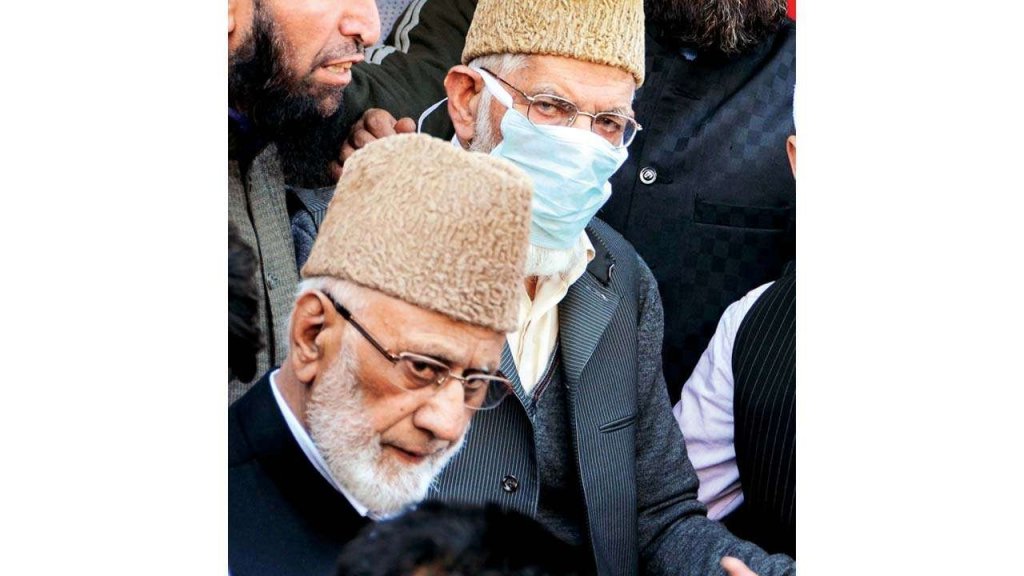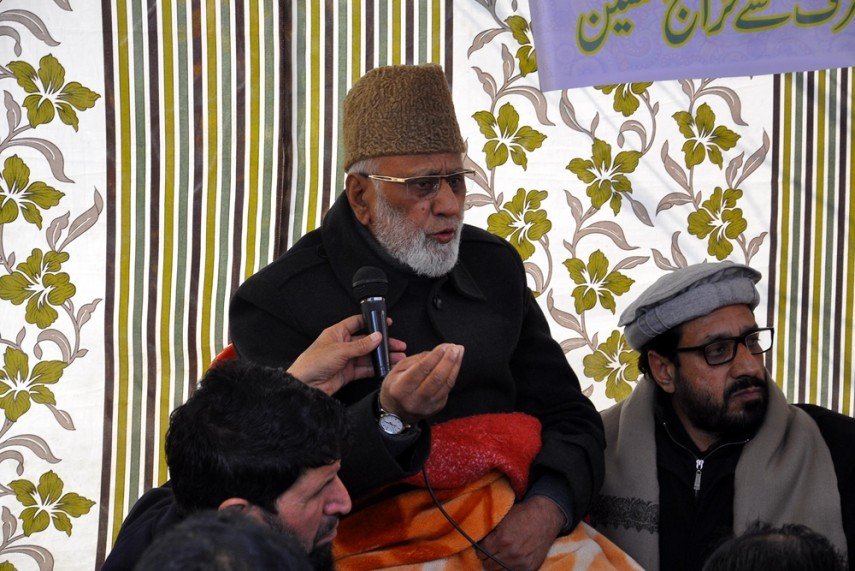
Throughout his life,“Sehrai Sahib lived by his name.” Originally born as Ashraf Ali in 1944 to the family of Khans—who had migrated to Tikki Pora Lolab from West Province in Pakistan before the Partition—he chose a name Sehrai implying ‘floater’ in a prison in company of Geelani. Since then, he is known to float between prisons and interrogation centres. But as a defiant youth, he first landed in jail in 1965 and continued facing incarcerations. In the sixties itself, Sehrai returned from the prestigious Aligarh Muslim University with BA (Hons) in Urdu—before adding Aadeb-e-Mahir and Aadeb-e-Kamil degrees to his name. He is being credited for launching JeI’s student wing, Shooba-i-Talaba, which was later renamed as Islami Jamiat-e-Talaba.Sehrai had freshly stepped out of the Central Jail Jammu in 1986 when Jama’at fielded him as Muslim United Front (MUF) candidate from Kupwara. Previously, JeI had fielded him against Sheikh Mohammad Abdullah from Ganderbal. Standing against “the lion of Kashmir”—apparently devoid of opposition—was itself a display of Sehrai’s fearless conduct
Apart from then odd campaigning gimmicks of MUF, including dressing their candidates in shrouds, flaunting firearms or invoking djinns to woo voters in their rallies,” says a senior scribe, “it was Sehrai, whose fiery speeches—conveniently mixing religion and politics—were getting noticed in a local press. His oratory skills would simply turn you into his captive audience.”
After 1987 elections were rigged, with most MUF leadership and their polling agents dragged to dungeons, Sehrai assumed the role of a captain whose immediate challenge was to steer clear the ship caught in the political tempest.
As a caretaker of Jama’at’s Batmaloo office, Sehrai would talk less like a romantic and more of a realistic, rubbishing the claims that “rigging prevented massive mandate to MUF”. In case of fair polls, he believed that MUF could’ve emerged as the reckoning opposition with around 20 seats only.
Once left battered in a crackdown by the Farooq Abdullah government, Sehrai strongly resisted the post-1987 poll events in Kashmir. His criticism to Shimla Agreement finally sent him back to jail.
Even among the insurgents of yore, Sehrai commands respect for lifting the prison mood with his scholarly take and authority on Iqbaliyat.
Sehrai was one of the first Jama’at leaders to endorse the armed uprising as a means of struggle against the Indian control in Kashmir, the former rebel says. “And the man did suffer for his unbending conviction.”
With Geelani, he floated TeH in August 2004, following a split in Hurriyat Conference with JeI’s support. While Geelani became its chairman, Sehrai was its Secretary General — until he succeeded 88-year-old rehbar on March 19, 2018.
He was among the other separatist leaders detained during the state-wide lockdown imposed aimed at to revoke special status of Jammu and Kashmir. Later in July 2020, he was arrested from Barzulla Baghat area of Srinagar by the Jammu and Kashmir police under the Public Safety Act and was serving imprisonment in district jail of Udhampur. His health deteriorated on 4 May. He was subsequently admitted to the Government Medical College, Jammu and died on 5 May in the hospital after resulting in failure of oxygen level. His family had submitted three applications to the high court requesting for his medical examination and treatment Government Medical College, Srinagar or Jammu, however his son Raashid alleged that the judge delayed the review of the submitted requests until his health deteriorated in jail week before he died in May.
“Sehrai, was a man of principles and commitment. Sehrai was a towering political personality who would be remembered for sacrificing his life for the just cause of Kashmir Sehrai has left this world with the dream of independent and sovereign Kashmir in his eyes”

Brief Introduction:
Mohammad Ashraf Khan (1944 – 5 May 2021), chiefly known as Ashraf Sehrai or just as Sehrai, was a Kashmir Separatist leader and chairman of Tehreek e Hurriyat, a united political front formed during the Kashmir Conflict. He was elected chairman through a first-ever election conducted in the history of Hurriyat when Syed Ali Shah Geelani relinquished office due to his deteriorating health. He served General Secretary and deputy chairperson of Jamaat e islami Kashmir . He was later appointed its head for political division.
Sehrai was born in 1944 in Tekipora village of Lolab Valley in Kupwara district of Jammu and Kashmir to Shams-ud-din Khan. His ancestors had migrated from areas now part of modern-day Pakistan to Jammu and Kashmir. He also has two elder brothers. One of them is Muhammad Yousuf Khan, one of the founders of Tehreek-e-Islami, who died in 2016.The other is Qamar-ud-din Khan, a renowned member of Jamat-e-Islami in the Lolab area who died in 2009.
As a student, he used to show an interest in religious and political discussions. He also has an interest in poems and literature and also authored writings as well as poems, most of which were published in “Azaan” and “Tulu” magazines. He started publishing Tulu in 1969 from Sopore . Sehrai commissioned articles, took care of its design as well as printing and also wrote for the column called Safa-e-Paksitan which covered the events happening in Pakistan. He and Syed Ali Shah Geelani dedicated a special issue to Allama Iqbal in which they both wrote lengthy columns against Kashmiri socialists and a writer called Ashia Bhat while also defending the magazine and Jamaat e islami, after the magazine’s claim of Iqbal not being a socialist led to a controversy.
He is the father of six children, including four sons and two daughters. His youngest son Junaid Ashraf Khan became a militant in March 2018, joining Hizbul Mujahideen. Another of Sehrai’s sons is named Rashid Ashraf.Two of his other sons are named Khalid and Abid Ashraf.
Sehrai has stated that he never expected Junaid to become a militant, but won’t request him to return.He was particularly instrumental in spreading the Azadi movement beyond the valley into the Muslim belt of Jammu region.Junaid later became Hizbul’s divisional commander, but was killed in an encounter with the CRPF and J&K Police on 19 May 2020. Sehrai personally led his funeral prayers attended by about 300 people despite the Lockdown due to the coronavirus pandemic
Sehrai has completed his primary education in his hometown Tekipora and secondary education from Sogam Lolab High School in 1959. After clearing secondary examination, he moved to Alighar Muslim University where he did Bachelor of Arts (Hons) in Urdu
He was first arrested on 13 March 1965 for speaking against the arrests by Mir Qasim who had ordered arrests of all those who participated in Sheikh Abdullah’s boycott call against the Indian National Congress in Jammu and Kashmir. He was then subsequently jailed in Central Jail, Srinagar for over twenty months. He was later prisoned by the authorities and spent about 16 years of his life in various jails of India, including in Jammu jail.
Sehrai became an affiliate of Syed Ali Shah Geelani in 1959 after being encouraged to do so by his elder brother. He has stated that he officially became a member as a “rukun” of Jamaat e islami in 1960. Sehrai was jailed for the first time in 1965 over anti-government activities after he delivered a speech criticising GM Sadiq’s government for repression of free speech and arrest of members of the Moh-e-Muqaddas Majlis-e-Amal. After he started focusing on the Tulu magazine, JeI cadres complained about him staying away from the organization’s activities and the magazine was thus shut down in 1971.
After the JeI expelled Geelani following the formation of his own Hurriyat conference party due to opposition to a dialogue with the central Indian government, Sehrai also left the group and was appointed as Tehreek e Hurriyat’s general secretary in 2004 during its foundation. Following the 2016-17 Kashmir unrest, NIA published a report to address his involvement in issuing protest calanders and carrying out anti-India activities.
He was appointed as the acting chairman by Tehreek-e-Hurriyat’s Majlis-e-Shoora on 19 March 2018.Later, he was elected as the chairman for 3 years on 19 August by a margin of 410 votes out of a total of 433, in the first-ever Hurriyat election since Geelani stepped down.
He was among the other separatist leaders detained during the state-wide lockdown imposed aimed at to revoke special status of Jammu and Kashmir. Later in July 2020, he was arrested from Barzulla Baghat area of Srinagar by the Jammu and Kashmir police under the Public Safety Act and was serving imprisonment in district jail of Udhampur. His health deteriorated on 4 May. He was subsequently admitted to the Government Medical College, Jammu and died on 5 May in the hospital after resulting in failure of oxygen level. His family had submitted three applications to the high court requesting for his medical examination and treatment Government Medical College, Srinagar or Jammu, however his son Raashid alleged that the judge delayed the review of the submitted requests until his health deteriorated in jail week before he died in May.
Sehrai’s family alleges that he was “murdered” by the authorities, while Jammu and Kashmir High Court Bar Association alleges his death a “Custodial Murder”.
“The Jammu and Kashmir Prisons Department, according to The Wire wrote a letter to the Department of Home seeking for available resources in the jail for Sehrai’s health condition, however jail officials didn’t receive any reply to the submitted letter from the home department.”

